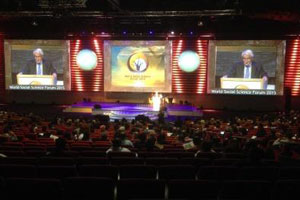Nearly a thousand delegates from across 84 countries are gathering right now in Durban, South Africa, for the third World Social Science Forum.
The first similar forum ‘One Planet – World Apart’, was held in 2009 in Bergen, Norway. The 2013 forum, ‘Social Transformations and the Digital Age’, took place in Montreal, Canada. The current forum is taking place in the Durban International Convention Centre (the same venue as COP17 in 2011) and focusses on ‘transforming global relations for a just world’.
 We were welcomed to the opening plenary by the chairs Andrew Kaniki (National Research Foundation, South Africa) and Wanda Ward (White House Office of Science and Technology, United States of America), before hearing from an international and diverse group of speakers.
We were welcomed to the opening plenary by the chairs Andrew Kaniki (National Research Foundation, South Africa) and Wanda Ward (White House Office of Science and Technology, United States of America), before hearing from an international and diverse group of speakers.
Olive Shisana (Human Sciences Research Council), Alberto Martinelli (International Social Science Council, Ebrima Sall (Council for the Development of Social Science Research in Africa) all gave important background to the conference, describing the vital role that good social science can play in fostering transformations for social justice.
‘Unfearing’ science
We also heard a different take on transformations from Desmond d’Sa, who recalled being removed from the same building during the COP in 2011. He spoke of the role of solid, transparent and ‘unfearing’ science in providing authoritative basis for action. He described how communities in Durban had mobilised against polluting industries owned by Exxon-Mobil in the city, not only through challenging some of the industry’s claims but through taking an active role in the knowledge underpinning policy. “Now”, he said, “we take our own air samples and interrogate the data.”
Nada Al-Nashif (United Nations Educational, Scientific and Cultural Organisation) raised the focus of Sustainable Development Goal 10 – reduction of inequality between and within countries, pointing to the fact that currently 1% of the world owns 50% of the world’s wealth.
From local knowledge to the Square Kilometre Array
Lastly we heard from South Africa’s Minister of Science and Technology, Naledi Pandor.
In a strong presentation about science (including social science) and technology in Africa, Pandor gave examples from her country that illustrate how they are already producing knowledge that has a role in their domestic setting, but not necessarily in the global knowledge economy.
African researchers, she said, need to define their own niche domain. At the same time, she described how South African investments such as the Square Kilometre Array were altering Africa from research subject to future research leader.
I remain to be convinced of the value of such investments in addressing equity and social justice, and fear that they may be seen as science for science’s sake. However I recognise that – if combined with appropriate action to translate and apply the knowledge and skills generated to concrete challenges on the ground, they can have an powerful (if indirect) impact.
The Minister’s closing plea to the audience “to become intellectual activists for global equality,” was a clear call to abandon the ivory tower and engage directly with such concrete challenges.
This seems to be a great platform for young students who aspire to become engineers, technologists, scientists, and leaders in the future. In fact, we require more and more of such kind of platforms where we facilitate young minds with technology, science, and education.
I too came across one such platform named LIYSF which offers the students aged 16-21 with a two weeks residential science event wherein they get the opportunity to attend lectures by various renowned scientists along with an option to visit world-class laboratories and universities. Here’s the URL for those who’d like to grab the opportunity.